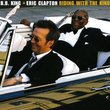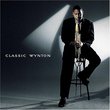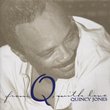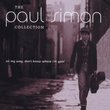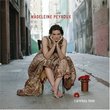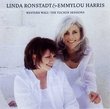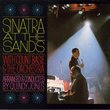| All Artists: Terence Blanchard Title: Flow Members Wishing: 1 Total Copies: 0 Label: Blue Note Records Original Release Date: 1/1/2005 Re-Release Date: 6/7/2005 Genres: Jazz, Pop, R&B Styles: Jazz Fusion, Modern Postbebop, Smooth Jazz, Bebop, Funk Number of Discs: 1 SwapaCD Credits: 1 UPCs: 650113500029, 724357827324, 724357827355, 724357827423 |
Search - Terence Blanchard :: Flow
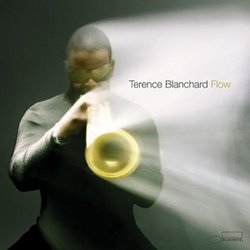 | Terence Blanchard Flow Genres: Jazz, Pop, R&B
Produced by the artist and four-time Grammy winner Herbie Hancock, Flow heralds nothing less than the brilliant second act of Blanchard's already extraordinary career. Flow is TB's rambunctiously heated answer to those une... more » |
Larger Image |
CD DetailsSynopsis
Album Description Produced by the artist and four-time Grammy winner Herbie Hancock, Flow heralds nothing less than the brilliant second act of Blanchard's already extraordinary career. Flow is TB's rambunctiously heated answer to those unenlightened few who doubted that this chill master of the urbane film score (Mo' Better Blues, Malcolm X, Barbershop) could get down. Indeed, Flow not only showcases Blanchard's prodigious instrumental and composing skills; it reveals him to be both a shrewd judge of young talent and a bandleader of Milesian dimension and magnitude as well. Similarly Requested CDs
|
CD ReviewsA major statement from Terence Blanchard Jan P. Dennis | Monument, CO USA | 06/11/2005 (5 out of 5 stars) "His last disc, Bounce, was pretty amazing, but this one casually trumps it. It's almost as if, having established a loose-limbed world-jazz esthetic, Terence Blanchard has discovered how to move within that sensibility with complete freedom yet with a rigor seldom encountered in the wild and wooly world of post-bop, free-jazz, world-music. A tip-off is the inclusion of Herbie Hancock as producer (who also guests on piano on two numbers). Hancock has found a way to situate this music squarely within the latest world-jazz aesthetic, yet make it entirely accessible to even the neophyte jazz listener--all, amazingly, without compromising either its jazz bona fides or its commercial appeal. My contention has always been that transcendent world-jazz, such as purveyed on this magical disc, is some of the finest musics available on the planet. One thinks of the magical music of Omar Sosa, the pioneering work of Egberto Gismonti, the huge statements of late period Yousef Lateef, the mysterioso contributions of Dhaffer Youssef. With this latest release, certainly the finest ever from Terence Blanchard, the march of marvelously mesmeric world-jazz advances to new plateaux. One of the reasons is the earthereal contribution of Lionel Louke, primarily on acoustic guitar, but occasionally on electric. Aaron Parks on piano also marks a significant advance over his estimable contributions to last year's Bounce. And if he's some marginally upstaged by Herbie's mesmeric contributions, that's nothing to be ashamed about; after all, we're talking about one of the prime keyboard innovators in recent jazz memory. This is music of the absolute highest accomplishment. I can hardly wait for the next installment from the amazing Terence Blanchard." Flow doesn't M. Murphy | birmingham, alabama United States | 09/18/2005 (3 out of 5 stars) "As a huge fan of Mr.Blanchard and a lover of his previous Bluenote cd "Bounce" I was anxiously awaiting his follow up "Flow". Unfortunately "Flow" doesn't. While Blanchard is a wonderful composer[Spike Lee's films] most of the tunes on Flow come from bandmates who clearly do not have Terance's compositional skills. The weakest ones seem to be 3 tunes by the guitar player which represents 22 minutes of the cd. In addition Blanchard's 3 versions of the song "Flow" are guitar heavy and could have used Herbie Hancock[the producer]on a different chordal instrument[piano]. The supporting players are all different from his previous cd[Bounce] save the great sax player and Blanchard bud Brice Winston. Flow is a move in a more electronic direction for Blanchard. It's a move that fellow young trumpet players like Nicholas Payton[Sonic Trance} and Roy Hargrove[RH Factor] have made with varying sucess. While Payton and Hargrove have great chops neither one of them is the composer that Blanchard is. Here's hoping Terrance goes back to doing what he does as well as anyone composing and playing interesting accoustic jazz. Better Blanchard choices along with "Bounce" are "Jazz In Film" "Wandering Moon" and "The Heart Speaks". Flows meanders in mediocrity unfortunately." Fantastic NEW album In Search of Sunrise | NJ | 01/07/2006 (5 out of 5 stars) "Amid the cries of "jazz is dead" that have plagued the past twenty years, the cats who know what's up have been following the insurgency of different influences in the music with a keen ear for that which might be called "fresh." In the last few years, the "jazz/hip-hop" thang has been done, notably by Roy Hargrove, but hell, on the other side of the spectrum, US3 dropped Hand On the Torch in 1993. Anyway, Flow is following directly in the modern tradition, infusing modern influences in a medium at risk of growing old in order to breathe new life into said medium. Since Dizzy wrote Manteca, and probably before, jazzers have been deliberately looking outside their own areas for new ideas. Coltrane did it, as did Getz, and now we've got Joe Lovano playing gongs to establish pedal points, and guys like Avishai Cohen or Dave Holland following the tradition of "serious music" by writing more in depth compositions, even for for smaller bands. The new crop of artists is taking the ideal of more complex compositions or more structured free jazz (check out the SF Jazz Collective) and throwing electronic instruments on it. It's only natural, as jazzers realized years ago that with a drum loop, a synth and a computer, you can take your horn to Europe and play dance clubs for ten times what you'd get for a jazz gig here in the US. Guys are taking that relationship and reversing it, adding electronica to the jazz. As far as just busting out the wild electronic sounds, this has been done since Bitches Brew dropped, Chick Corea had the Electric Band, or we had Weather Report or any of the old bands with amps. I don't see why people are objecting to it's occurence here. Younger cats like Hiromi (Uehara) and Christian Scott are writing new music in this vein to great effect. Terence Blanchard has been around the block a few times. He knows how to write and arrange. So if you are looking for some fresh music that follows the NEW tradition in superb form, buy this album."
|

 Track Listings (11) - Disc #1
Track Listings (11) - Disc #1